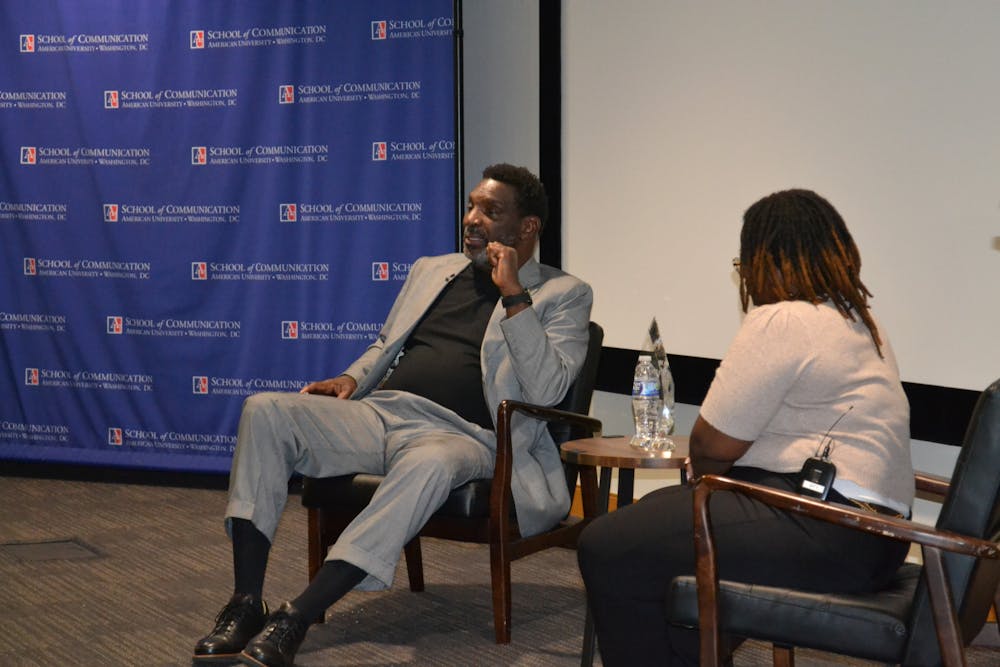American University’s Public Relations Student Society of America chapter hosted their annual Icons of DC event on Sept. 19. The event, co-sponsored by the Phi Sigma Pi Honors Fraternity and the Kennedy Political Union, featured former Washington quarterback Doug Williams.
Williams joined representatives from the American Medical Association, the National Association for the Advancement of Colored People, the American Nurses Association and the American Civil Liberties Union in sharing the honor.
Williams was originally drafted by the Tampa Bay Buccaneers in 1978. He was the first Black quarterback to be drafted in the first round of the NFL draft. He departed Tampa Bay after five seasons and sat out another due to pay disputes.
Williams joined Washington in 1986, and played with the team for four years until 1989. During his time on the team, the team won Super Bowl XXII in 1988, making him the first Black quarterback to ever win the Super Bowl and the game’s MVP. Williams threw four touchdowns in that game, a 42-10 rout of the Denver Broncos.
Williams took the stage and opened by reflecting on the meaning of the award, and how the word “icon” sticks out to him. He elaborated on this by listing off some of his proudest accomplishments, including the founding of the Black College Football Hall of Fame and its move to Canton, Ohio to be near the Pro Football Hall of Fame.
“It was the greatest feeling of my life playing with Washington,” Williams said. “But I’m standing here on Coach [Joe] Gibbs’ shoulders.”
Williams said that Gibbs was the person who gave him the opportunity to start for the team after Washington’s starter went down with an injury. He reminisced about his practice routine, saying that he always prepared to start, even if he knew he wouldn’t be starting. Williams said that is a mentality that he took into his life overall, but it especially applied in football.
He said that the support he received from Washington’s fanbase after winning the Super Bowl was unexpected, but extremely welcomed, and put things into perspective for him — it showed him just how much impact he had. Even after his football career ended, the impact he had on the city and the impact the city had on him stuck with him. “I’ll be forever grateful for the DMV,” he said, “This award means everything to me, I’ll forever be an icon in Washington, D.C.”
After this point, Williams and moderator Julia Mouketo, a graduate student in the School of Communication, fielded questions from the crowd. He answered a variety of questions, but two themes stuck out: the state of diversity in the NFL, and Williams’ advice for any future generations of people, going into sports or otherwise.
On the state of the NFL, Williams addressed two separate questions. The first was the nature of the new University of Colorado head coach Deion Sanders and the lack of diversity in head coaching positions, both at the college and NFL level. Williams said, “There’s only one Deion Sanders. He is out there talking truth to power, and proving that Black men in America can coach a football team.”
When asked about the lack of diversity in coaching in the NFL, Williams said “It irks me more than anything. [NFL] ownership does not want to trust their team in a Black man’s hands. This comes even with the fact that a majority of the players in the NFL are Black, and they resonate with someone who looks like them.” When asked more specifically about NFL owners failing to diversify the front offices of their teams, he emphasized that owners need to diversify their hiring practices, and that it stings to see that “the dressing room is 75% Black, but the front office is 85% white.”
The Washington College of Law hosted senior NFL writer Jason Reid last semester in a similar event, and Reid spoke a lot of “the era of the Black quarterback.” When Williams was asked about it, Williams said, “the starting quarterback on the team should be the person who can best do the job. We should have three or four more guys coming into the league next year who are Black quarterbacks capable of starting for teams. I’m sad it took this long for us to get 14 Black starting quarterbacks in the league, and that even now they play under a microscope, not the way they should need to play.”
Williams finished by giving advice for the younger generation of athletes and people alike. For athletes and football players, he said “Prepare for what comes after football. If you’re in college, get a degree. If you’re good at what you do, the scouts will find you.” To the general audience, Williams said to lead by example, eliminating racism from every facet of whatever profession they find themselves in. He said if this generation can do that, others will see it and replicate it.
“Do what you do, hope they see what you want to do and follow you.”
This article was edited by Penelope Jennings, Delaney Hoke and Abigail Pritchard. Copy editing done by Isabelle Kravis.





